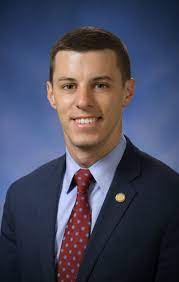
Michigan House of Representatives
Former House Speaker Lee Chatfield, R-Levering, faces allegations that include bribery, embezzlement and campaign finance violations.By ERIC FREEDMAN
Capital News Service
LANSING – The escalating criminal and ethics controversy enveloping former House Speaker Lee Chatfield is a reminder of how far the mighty can fall.
As the top honcho in the GOP-controlled House in 2019-20, Chatfield was one of Michigan’s two most powerful state legislators.
But once the Emmet County Republican left office due to term limits, he’s been on the firing line as investigative journalists, especially those at the Detroit News, and law enforcement agencies probe a wide range of his activities.
They include allegations of sexually abusing his future sister-in-law when she was underage and that he was involved in bribery, embezzlement and campaign finance violations.
The latest news reports focused on free travel and meals he received and examined whether he’d used his influence to get favorable treatment for clients of a Lansing lobbying firm, including a tribal casino in Muskegon County and a cannabis retailer.
Chatfield, who had been Michigan’s youngest speaker, hasn’t been criminally charged.
For all its perceived power and prestige, a speakership may bring temptations marked by greed, influence-peddling, favoritism and lax enforcement of ethics standards.
Such temptations pay no regard to party affiliation, and Chatfield is by no means the country’s only state House speaker in deep legal hot water. In some states it’s happened more than once.
Earlier this year, a federal grand jury in Chicago indicted former Illinois Speaker Michael Madigan, a Democrat on bribery, conspiracy, fraud and racketeering charges. He’s accused of using his position to corruptly solicit and receive financial benefits for himself and associates.
Announcing the charges following an investigation by the FBI and IRS, the U.S. Attorney’s Office said that for almost a decade Madigan had engaged in “multiple schemes to reap the benefits of private legal work unlawfully steered to his law firm, including legal work from those with business before the state of Illinois and city of Chicago.”
It’s also been a tough year for a former Tennessee Speaker Glen Casada, who was named in an August corruption indictment accusing him of bribery, accepting kickbacks and other crimes.
Casada, a Republican, and his former chief of staff are charged with creating a bogus company and ghost person to receive state funds. The two men were the actual owners of a political consulting firm they claimed was run by a nonexistent “Matthew Phoenix,” federal prosecutors said.
Also this year, former New York Speaker Sheldon Silver, a Democrat, died in federal prison while serving time for a 2005 conviction on extortion, money-laundering and fraud charges. Silver took almost $4 million to benefit real estate developers and a cancer researcher.
Last year, the Ohio House expelled ex-Speaker Larry Householder, a Republican who is under indictment on charges of orchestrating a bribery, racketeering and money laundering plot. The indictment alleged that Householder and his codefendants designed the scheme to win approval of a $1 billion bailout for two nuclear power plants.
Criminality by state House speakers isn’t a new phenomenon. Here are more examples:
In 2016, former Alabama Speaker Mike Hubbard, a Republican, went to prison for violating ethics laws.
Rhode Island Speaker Gordon Fox, a Democrat, pleaded guilty in 2015 to bribery, fraud and filing a false tax return for spending campaign funds for personal expenses and taking a bribe in a liquor license case.
In 2014, former South Carolina Speaker Bobby Harrell, a Republican, was imprisoned for taking campaign money for personal use.
Former Massachusetts Speaker Salvatore DiMasi, a Democrat, was convicted in 2011 of accepting kickbacks to help a software firm obtain multimillion-dollar government contracts.
The same year, former Pennsylvania Speaker John Perzel, a Republican, pleaded guilty to conflict of interest, theft and conspiracy in a plot to use taxpayer dollars for computer technology that would benefit GOP political campaigns.
Also in 2011, former Missouri Speaker Rod Jetton, a Republican, pleaded guilty to misdemeanor assault. He’d been arrested for recklessly injuring a woman during sadomasochistic sex. The previous year, a grand jury investigated Jetton for possible bribery but filed no charges.
Here are some others:
- In 2007, another former Massachusetts speaker, Democrat Thomas Finneran, was convicted of obstruction of justice for lying about his part in a redistricting plan that weakened the power of minority voters.
- The same year, former North Carolina Speaker Jim Black, a Democrat, was sentenced for taking payoffs from chiropractors to support legislation favorable to the profession.
- A jury convicted former California Speaker Brian Setencich, a Republican, of cheating on his taxes in 2000.
- In 1999, former Florida Speaker Bolley Johnson, a Democrat, was convicted of tax evasion stemming from consulting work he did for a casino and gaming firm.
- In 1995, another former Missouri speaker, Democrat Bob Griffin, pleaded guilty to bribery and mail fraud for accepting a payoff from a political consultant.
- Former Maryland Speaker A. Gordon Boone, a Democrat, spent 13 months behind bars on a 1964 mail fraud conviction tied to a savings and loan scandal.
As for Chatfield, his own future is still unclear, but his situation leaves us wondering whether self-dealing, abuse of office and out-and-out criminal conduct are occupational hazards at the top of the legislative power pyramid.
Eric Freedman, the director of MSU’s Capital News Service, has reported on state government for more than 40 years, first in Albany, New York, and in Lansing since 1984.